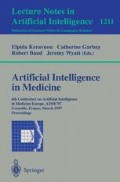Abstract
Clinical decision-support opportunities in oncology are numerous. Application programs may assist the diagnostic process, help define the proper therapy and adjust it to the patient's characteristics, streamline the delivery and follow-up of the treatments, provide tools for patient tracking and outcome measurements, and support patient care in the community. The authors and their colleagues have extended a novel general-purpose direct care-provider order entry system to take into account the particular aspects of chemotherapy ordering and decision-support. This new approach takes advantage of the infrastructure and functions of the integrated medical information system.
Preview
Unable to display preview. Download preview PDF.
References
Baak JP. Artificial intelligence systems (expert systems) as diagnostic consultants for the cytologic and histologic diagnosis of cancer. Report from the Second International Conference, March 13–15, 1988, Chicago, Illinois. Journal of Cancer Research & Clinical Oncology. 1988; 114(3):325–34.
Enterline JP, Lenhard RE Jr., Blum BI, et al.. OCIS: 15 years' experience with patient-centered computing. MD Computing. 1994; 11(2):83–91.
Geissbuhler A, Miller RA. WizOrder, a user-friendly interface for order entry and clinical decision support tools. Proceedings of the SCAMC; 1995:1002.
Hickam DH, Shortliffe EH, et al. The treatment advice of a computer-based cancer chemotherapy protocol advisor. Annals of Internal Medicine. 1985; 103:928–36.
Hubbard SM, Marin NB, Thurn AL. NCI's cancer information systems—bringing medical knowledge to clinicians. Oncology. 1995; 9(4):302–6
Miller RA. Medical diagnostic decision support systems — past, present and future: a threaded bibliography and brief commentary. JAMIA. 1994; 1:8–27.
Stead WW, Borden R, Bourne J, Giuse D, et al. The Vanderbilt University fast track to IAIMS: transition from planning to implementation. JAMIA. 1996;3:308–17.
Wirtschafter D, Carpenter JT, Mesel E. A consultant-extender system for breast cancer adjuvant chemotherapy. Annals of Internal Medicine. 1979; 90(3):396–401.
Yount RJ, Vries JK, Councill CD. The Medical Archival System: an information retrieval system based on distributed parallel processing. Information Processing & Management, 1991;27(4):379–389.
Author information
Authors and Affiliations
Editor information
Rights and permissions
Copyright information
© 1997 Springer-Verlag Berlin Heidelberg
About this paper
Cite this paper
Geissbühler, A., Miller, R.A., Stead, W.W. (1997). The clinical spectrum of decision-support in oncology with a case report of a real world system. In: Keravnou, E., Garbay, C., Baud, R., Wyatt, J. (eds) Artificial Intelligence in Medicine. AIME 1997. Lecture Notes in Computer Science, vol 1211. Springer, Berlin, Heidelberg. https://doi.org/10.1007/BFb0029455
Download citation
DOI: https://doi.org/10.1007/BFb0029455
Published:
Publisher Name: Springer, Berlin, Heidelberg
Print ISBN: 978-3-540-62709-8
Online ISBN: 978-3-540-68448-0
eBook Packages: Springer Book Archive

